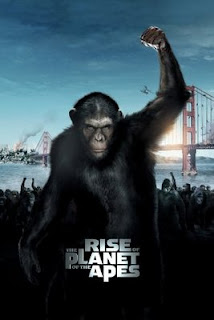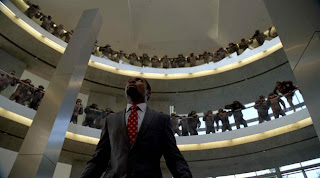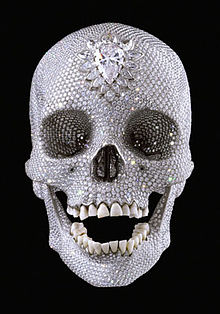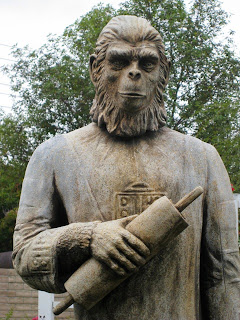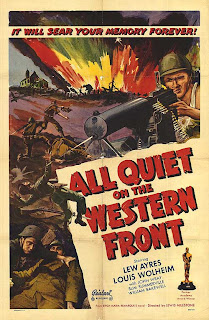 "Up at the front you're alive or you're dead and that's all. You can't fool anybody about that very long. And up there we know we're lost and done for whether we're dead or alive."
"Up at the front you're alive or you're dead and that's all. You can't fool anybody about that very long. And up there we know we're lost and done for whether we're dead or alive."Introduction
After many weeks of Planet of the Apes, we are back to some true classic staples of Pre-1977 cinema. Initially published as a book in 1928, All Quiet on the Western Front became successful due to its description of the brutal physical and mental struggle soldiers endured during World War I. In a fascinating twist, the book was banned by Nazi Germany and burned. Told from the perspective of the German's, it is a film that established itself further in history as it swept the big two awards at the Oscars - both Best Director for Lewis Milestone and Outstanding Production (The 'Best Picture' of its day). At a time, in between the two biggest wars the world has ever seen, this film would go to inspire Spielberg and Kubrick, and cannot be ignored as an essential film of the War genre.
The story presents a group of school boys who are inspired to fight in the war by their school master - they would be fighting "for their Fatherland": Germany. Considering it is portraying German soldiers in a sympathetic light, there is a slight understanding towards the decision by Universal to alter the film when re-releasing the film between 1939 and through to 1980. In 2000, Universal ensured a full restoration. The episodic nature of the the film could be broken into mini-chunks and, in this respect, could've inspired Band of Brothers. Stories relating to the training under a senior officer who worked as a postman prior to the war is similar to the character of David Schwimmer in the HBO mini-series. This then leads to scenes portraying the men first witnessing death and sequences which show characters killing other men. The struggles they go through are harrowing and give a shocking insight into the horrors these men endured.
By starting the film with a large group we know as viewers that, throughout the film, the men lose their life. Some die from injuries on the front line. Some men die of mental illnesses whilst others die of an obsession with home. This is the large scale the film works upon. Milestone depicts close, personal conversations between the men - and contrasts this with fights on the battlefield. Even the sequences at war look similar to those we would see on a documentary. Milestone puts us in the middle of the action - and forces us to confront the horror.
The film is almost bookended by the speech the school master is giving to the children at the school. At the start of the film we see him inspire a complete class to get up, celebrate the end of school, and set off to be on the front line. Our lead character Paul (Lew Ayres) revisits the school and witnesses the school master giving the same speech to a group of younger men. Paul steps in and tries to explain the real cost of serving "the Fatherland" but the children shout at him as the school master looks on confused and unimpressed
During the story, specific sequences are unforgettable. In an early story, new recruit Behm (Walter Rogers), witnesses death alongside the group and clearly cannot stomach it. We then witness his death as the group put up barbed-wire. He screams out in agony "I'm blind" and Milestone doesn't cut away. We watch, alongside the new recruits, this poor boy stumbling around waiting for the peace of death.
Franz Kemmerich (Ben Alexander) is another interesting character. A man who takes great pride in his history as he is deeply attached to his boots - boots which were worn by his Grandad. Whenever I think about World War I, I always think about the range of diseases many men recieved through the awful conditions in the trenches. Wearing boots weeks on end before falling victim to the condition commonly called "Trench Foot" ("a condition in the feet where they started off by wrinkling up like when you’ve been in the bath too long, but as time goes on, blisters developed and the pain for the soldiers was immense"). Kemmerich is wounded and a fellow soldier, Mueller (Russell Gleason), asks for his boots. Initially shocked at his request, it transpires that Kemmerich id dying and Paul reluctantly carries the boots to Mueller after his death. The following few scenes show the boots passed from one soldier to another, until we see a soldier shot down and then piled onto a truck amongst other bodies. It seems that on the battlefield - your love for your family and your past means little.
Every character, it seems, has a different story to tell. And they all have differing attitudes to war. Some give the impression that they thrive off of it. Others desperately want to go home. The repeated use of the phrase "well, at least you're goin' home" clearly shows how soldiers would achieve great solace from knowing this, despite huge illnesses. In shots of the soldiers at the end of the film, you can recall small snippets of a story from each of them - and you believe in them. Which makes the story so much more tragic.
 Value of Life
Value of LifeI wanted to discuss a specific scene which, like Paths of Glory, aggressively attacks the very nature of war. At one point, Paul becomes ecstatic when Kemmerich passes. He says he feels alive and hungry - but it is short lived when he is involved in an attack through a cemetery. Paul is forced to stab a French soldier - close proximity, a real taste of the murder soldiers need to commit to keep themselves alive. In the hole, he lays with the soldier all night and starts talking to himself. He hopes the man is alive. He wants to help him survive - but he also knows he should see him as the enemy. He can see it is just another man on the opposite side of the track. He is frustrated because when it comes down to it, it is simply one man killing another. Patriotism, in this hold, with this man, does not exist.
Possibly the most iconic moment in the film is when Paul returns to his school master. I managed to find a monologue-version of this final sequence (in the film, the school master "ifs" and "buts" during the sequence). He challenges the nature of patriotism and the completely detached-manner that others, safe at home, live their lives. The politics and discussions are arrogant, delusional and false.
I can’t say anything…I can’t tell you anything you don’t know. We live in the trenches out there. We fight. We try not to be killed; sometimes we are. That’s all… I’ve been there! I know what it’s like…. I heard you in here reciting that same old stuff, making more iron men, more young heroes. You still think it’s beautiful and sweet to die for your country, don’t you? We used to think you knew. The first bombardment taught us better. It’s dirty and painful to die for your country. When it comes to dying for your country, it’s better not to die at all. There are millions out there dying for their countries, and what good is it?…You asked me to tell them how much they’re needed out there. He tells you, ‘Go out and die.’ Oh, but if you’ll pardon me, it’s easier to say ‘go out and die’ than it is to do it….And it’s easier to say it than to watch it happen…
The film ends as Paul dies, reaching for a butterfly. He desperately seeks the gentle grace and beauty of life - but he is shot (by a similar-looking soldier to the one he killed himself). This is a film which documents a time whereby war was real and many young men died for their country. Upon watching All Quiet on the Western Front, I believe those deaths are not in vain - but that they were sent to their death by those who don't understand the value of life. And maybe war itself degrades the beauty and grace of life.







